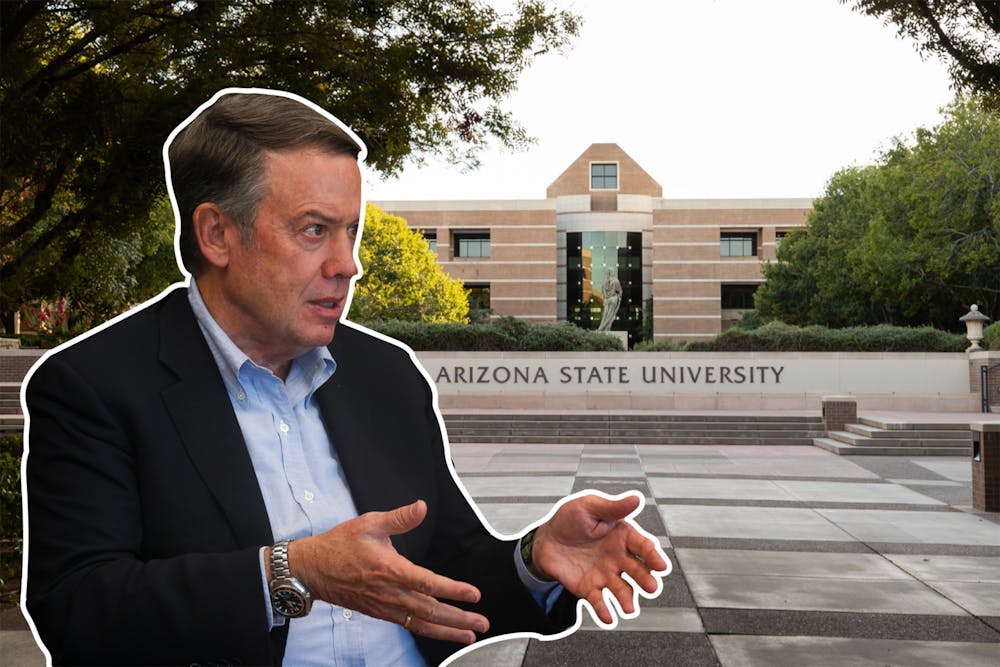ASU President Michael Crow said at a student forum on the West Valley campus Tuesday that the University is "approaching the timeframe" to begin appointing a new athletic director, nearly four months after Ray Anderson stepped down from the decision.
The forum for Crow's second Q&A of the semester was moderated by Alexis Blasko, the president of USG West Valley and a senior studying health sciences, and Megan McCaughan, the president of the Graduate and Professional Student Association and a graduate student studying molecular and cellular biology.
At the forum, Crow said his main priority is restructuring "the relationship between athletics and the University."
He said they would only appoint a new athletic director once the athletic department is an "integrated unit like all the other units within the University financial and organizational infrastructure." Currently the interim athletic director is senior vice president for Educational Outreach and Student Services, James Rund.
"We have to find a way for it to be as self-sustaining as possible, which is quite challenging financially," Crow said.
Crow later referenced the Monday National Labor Relations Board ruling on Dartmouth College basketball players being employees with the ability to unionize. The ruling could have far-reaching consequences on the college athletics landscape.
"We have to find a way to advance the idea of scholar-athletes in the middle of a world that's changing rapidly," Crow said.
Crow acknowledged the importance of college athletics and said he would like to see both football and basketball perform better. He said athletics increase the visibility of the University nationally, and gave the example of the recent ASU vs. USC men's basketball game, which was nationally televised on Fox.
Past athletics, Crow addressed student concerns regarding student loan forgiveness from a "policy perspective," saying that it would be better for the government to give the money to the University to assist the students in graduating, rather than the government forgiving student loans since "your chances of being able to retire the debt go up dramatically" if you graduate.
"I don't have to be a big fan of loan forgiveness," Crow said. "Because I think that we live in a society where if you borrow money and spend the money that is someone else's money, then someone has to pay that money back. In this case, the government is saying, 'we will pay that money back,' and I think they have an economic purpose for that."
One student-submitted question asked how ASU is monitoring and reacting to antisemitism happening on campus.
"Antisemitism is hate speech," Crow said. "And hate speech is prohibited."
Crow said that free speech is a tug-of-war with all sides of the political spectrum when inviting people outside of the campus, and that if ASU students, student groups or faculty want someone to come speak on campus, they will be allowed to with the exception of criminal, safety, planning and hate speech issues.
"Those people are going to speak here," Crow said. "And they do speak here."
READ MORE: Rep. Rashida Tlaib calls into pro-Palestine protest after ASU cancels event
Crow expanded on free speech later in the discussion, centering on how events and live discussions are monitored carefully through a specific set of regulations.
Crow started the forum with updates about the University, including that it has "emerged now as one of four universities in U.S. history to break our research expenditure level without a medical school." He said the other three universities are MIT, UC Berkeley and Georgia Tech. In response, he said he has been asked by "government leadership" to build an "engineering-brained Star Trek medical school."
The new medical school is planned to be built on the Downtown Phoenix campus as a part of an initiative from the Arizona Board of Regents to address healthcare needs in Arizona.
READ MORE: New ASU medical school to be built on Downtown Phoenix campus
A graduate student, whose name was not given, asked if the research funding available to undergraduate and graduate students as well as professors for research purposes will increase or decrease.
Crow said that students should expect an increase in research funding, but it will be varied between different classrooms.
"They may not see it in Professor X's lab. But Professor Z, two floors up, has lots of new resources because of a startup or because of grants that have been awarded or foundation awards that have come in (or) philanthropy that's come in," Crow said. "So it's highly variable."
Edited by Shane Brennan, Alysa Horton and Caera Learmonth.
Reach the reporter at gheadle@asu.edu and @George_Headley7 on X.
Like The State Press on Facebook and follow @statepress on X
George is a sophomore studying journalism and mass communication. This is his fourth semester with The State Press. He has also worked at Times Media Group and KJZZ.




